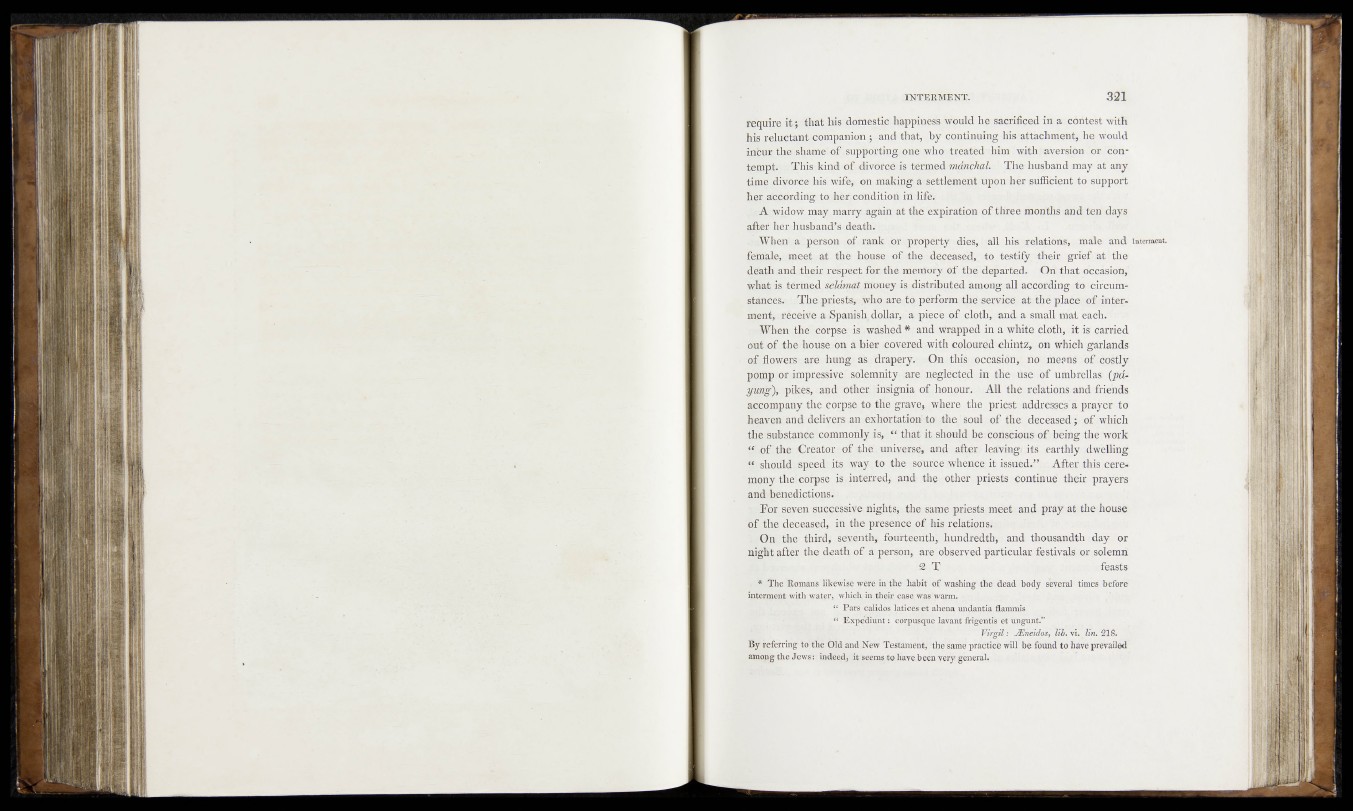
INTERMENT. 321
require it ;i'..ïjiat.-his domestic happiness; would he < sacrificed in a contest with
his reluctan ^companion ,;rfand that, by continuing bis1 attachment, he would
infcur th.e shameioJ'isuppo'EtipgfOnei who treated"him with:aversion or contempt.
. This-:kind c f èiv<Qrq^is^térmed'mawcÂa/.;Ji'I:^;è'husband may at any
time divorce his -wi-fe^ on making a.'set'tlspient upon her sufficient to support
her according taherlconditioh in life.* t. r!i
A widow, may .marry-again at the expiratipn pf three months and ten days
after her husband’s death.:
-tcWhen aii person of. rank orvpropërty dies, 'all his,^relations, male and interment,
fepale,- meet at thé hbn&eoofkthe ^deceased,; to testify •Æheir grief "ât the
death and:their respect for the memory of »the'departed. On that occasion,'
what is tèrm&à- seldmàt.money, is.distributed among all according to circumstances.'
.The priests, who are to perform'the service at.the place of interment,
/receive a .'Spanish, dollar, avpiècé of cloth',’ and a small mat fea'ehvth'”
When the,’Corpse.1; is .washed * and wrapped in a white clqth^it is carried
out .of the house on a <bier »covered-with coloured1 chintz, on which garlands
of powers-, are hiing, as drapery. On jthis'iOccasiôn,r no tmeans' : of .costly
pomp orrlmpressive solemnity ,are.'/neglected; in the.üseiibf umbrellas1 (pd? '
ywng'), < »pikes, and other insignia of ,henour. All thea relations and friends
accpmpany the corpse,to the grave, where the priest.’addresse's â prayer to
heaven and delivers .an .exhortation^ to the isouLof the deceased ;. ,pf= which
therSubstance commonly is, “ that it should be.'conscious of being the work
tfiôfjthe; ;Greator„ of the «ppiverse, and after-leavingi its earthly#idLwelliug
îû'should speed) its way,to the1-sojpfee'whence, ifcissnedd’u After tthis cere»
'-s|aay theicbtpse lisvintêfredf and the other'priests continue their prayers
-andfcnedictions- .
■r?3?or seven successive nights, the same priests meet and pray at the house
of the deceased, in the presence of his relations;*'-^
. On the; third,' sevpnthy fourteenth' hundredth, and thousandth day or
night after the death of’àtperson, arè observed particular festivals or solemn’
J.',> it’i Ü < .feasts
* • The1 Romans likewise were in the habit1 of washing the dead body several times before
interment with water, which ih^their ease was-warm, v ,
“ Ears caiidos laticeset ahena undantia flamims
V;-, “ Expedient : corptfêtjtîe lavant frigefitis et tmgurif.”
Virgil’: Æneidos, Jih.vi. lin. ÈÏSj
By referring-to-the Old and New Testament,' the same pràctièé wilfbe found to have prevailed
amopg the Jews : indeed, it seems to have been very general.- .